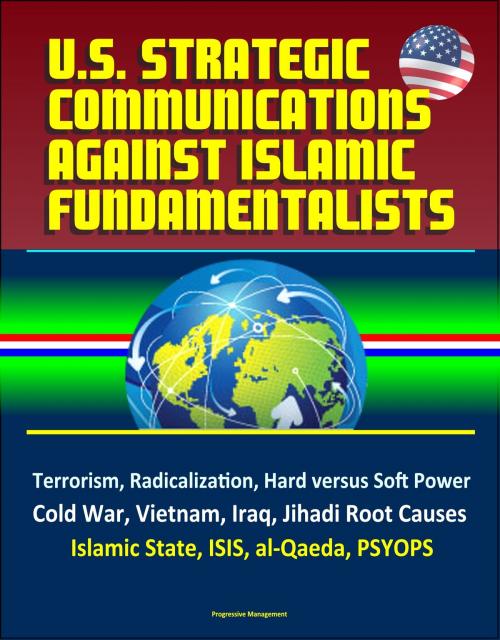U.S. Strategic Communications Against Islamic Fundamentalists: Terrorism, Radicalization, Hard versus Soft Power, Cold War, Vietnam, Iraq, Jihadi Root Causes, Islamic State, ISIS, al-Qaeda, PSYOPS
Nonfiction, Social & Cultural Studies, Political Science| Author: | Progressive Management | ISBN: | 9781370102303 |
| Publisher: | Progressive Management | Publication: | October 5, 2016 |
| Imprint: | Smashwords Edition | Language: | English |
| Author: | Progressive Management |
| ISBN: | 9781370102303 |
| Publisher: | Progressive Management |
| Publication: | October 5, 2016 |
| Imprint: | Smashwords Edition |
| Language: | English |
This important report has been professionally converted for accurate flowing-text e-book format reproduction. Strategic communications play a vital role in the fight against terrorist groups, especially in Muslim nations. This thesis analyzes the United States' policies and strategic communications in the post-September 11, 2001, war against Islamic fundamentalists to determine if U.S. strategic communication policies have been effective in countering Islamic extremism. From the findings, it is evident that U.S. strategic communications have failed in countering radicalization and moderating the minds of Muslim populations overseas—or among diaspora populations in Western countries. Marginalization and poor assimilation strategies; awkward distribution of competencies between the Central Intelligence Agency, the Pentagon, and the State Department; a lack of global perspective; and failure to learn from past military operations are some of the factors that have contributed to the problem. Reinstatement of a central agency for strategic communications, modeling of solutions for specific groups, and analysis of historical war successes and failures are important in ensuring the effectiveness of strategic communications in the fight against terrorist groups.
CHAPTER I - INTRODUCTION * A. MAJOR RESEARCH QUESTION * B. IMPORTANCE * C. PROBLEMS AND HYPOTHESES * D. LITERATURE REVIEW * 1. Radicalization * 2. Hard Power versus Soft Power * E. THESIS OVERVIEW * CHAPTER II - STRATEGIC COMMUNICATIONS * CHAPTER III - HISTORICAL WARS * A. THE COLD WAR * B. THE VIETNAM WAR * C. IRAQ, DECEMBER 2007 TO FEBRUARY 2009 * D. COMPARISON * CHAPTER IV - RADICALIZATION * A. ROOT AND TRIGGER CAUSES * 1. Micro-Level Processes * 2. Mid-Level Processes * 3. Macro-Level Processes * B. SUMMATION OF THE LEVELS * C. JIHADI ROOT AND TRIGGER CAUSES * D. FAILURE OF U.S. STRATEGIC COMMUNICATIONS * E. CONCLUSION * CHAPTER V - CONCLUSION
This important report has been professionally converted for accurate flowing-text e-book format reproduction. Strategic communications play a vital role in the fight against terrorist groups, especially in Muslim nations. This thesis analyzes the United States' policies and strategic communications in the post-September 11, 2001, war against Islamic fundamentalists to determine if U.S. strategic communication policies have been effective in countering Islamic extremism. From the findings, it is evident that U.S. strategic communications have failed in countering radicalization and moderating the minds of Muslim populations overseas—or among diaspora populations in Western countries. Marginalization and poor assimilation strategies; awkward distribution of competencies between the Central Intelligence Agency, the Pentagon, and the State Department; a lack of global perspective; and failure to learn from past military operations are some of the factors that have contributed to the problem. Reinstatement of a central agency for strategic communications, modeling of solutions for specific groups, and analysis of historical war successes and failures are important in ensuring the effectiveness of strategic communications in the fight against terrorist groups.
CHAPTER I - INTRODUCTION * A. MAJOR RESEARCH QUESTION * B. IMPORTANCE * C. PROBLEMS AND HYPOTHESES * D. LITERATURE REVIEW * 1. Radicalization * 2. Hard Power versus Soft Power * E. THESIS OVERVIEW * CHAPTER II - STRATEGIC COMMUNICATIONS * CHAPTER III - HISTORICAL WARS * A. THE COLD WAR * B. THE VIETNAM WAR * C. IRAQ, DECEMBER 2007 TO FEBRUARY 2009 * D. COMPARISON * CHAPTER IV - RADICALIZATION * A. ROOT AND TRIGGER CAUSES * 1. Micro-Level Processes * 2. Mid-Level Processes * 3. Macro-Level Processes * B. SUMMATION OF THE LEVELS * C. JIHADI ROOT AND TRIGGER CAUSES * D. FAILURE OF U.S. STRATEGIC COMMUNICATIONS * E. CONCLUSION * CHAPTER V - CONCLUSION















